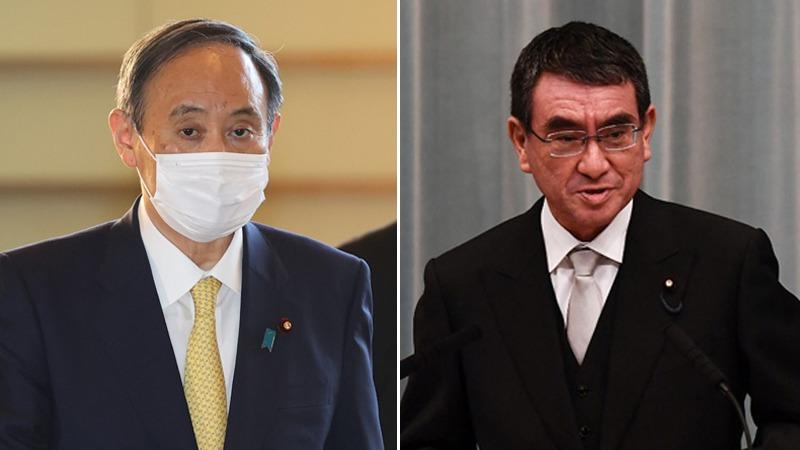 This combo photo shows Japanese Prime Minister Yoshihide Suga (left) and Japan's Administrative Reform Minister Taro Kono. (PHOTOS / AFP)
This combo photo shows Japanese Prime Minister Yoshihide Suga (left) and Japan's Administrative Reform Minister Taro Kono. (PHOTOS / AFP)
One of them is a seasoned public communicator, as comfortable debating his Davos counterparts in English as he is explaining the potential side-effects of coronavirus vaccines. The other is Japan’s prime minister.
Just as Yoshihide Suga is facing a pivotal moment in his premiership, he is finding himself being eclipsed by cabinet member Taro Kono, an outspoken politician appointed three weeks ago to lead an imminent vaccine rollout. Polls show Kono is already voters’ favorite for premier, an ominous sign for Suga ahead of a party leadership vote in September that will determine whether he stays on or joins the long roster of short-lived leaders.
PM Yoshihide Suga has seen his support halved since taking office five months ago, as his emphasis on the economy jarred with voters more concerned about controlling the virus, while a series of scandals sullied his image
The contrast between the two has been on full display this month as Japan tries to turn the corner on record coronavirus cases and launch its vaccination program. Both efforts are crucial to keeping on track its plans to host the Summer Olympics from July in Tokyo.
Last week, Suga, 72, stumbled his way through a news conference, triggering social media jokes about his discomfort with what he told reporters was his first experience with a teleprompter. On the same day, Kono, 58, uploaded a video to Twitter that garnered about 400,000 views in which he smoothly explained the potential side effects of the vaccines ahead of a mid-February campaign.
“The Suga administration is seen as being a bit slow on the vaccine and virus policy in general,” said Tsuneo Watanabe, a senior fellow at the Sasakawa Peace Foundation in Tokyo. “Sometimes you need a knack for moving things forward, and if you want to do that, Kono is the right person.”
Suga has seen his support halved since taking office five months ago, as his emphasis on the economy jarred with voters more concerned about controlling the virus, while a series of scandals sullied his image. The latest included revelations last week the government was investigating tabloid allegations that Suga’s businessman oldest son illicitly wined and dined Internal Affairs Ministry officials.
ALSO READ: Japan outbreaks make Suga look more like short-term premier
Kono, a former foreign minister and defense chief, became the country’s most-followed politician on Twitter over the weekend, adding to evidence he could be a strong election contender. His tally of more than 2.2 million followers edged above that of former premier Shinzo Abe on Sunday, the Nikkei newspaper reported, leaving Suga far behind, with less than 400,000.
Kono was also the public’s top choice to become the next prime minister in a poll published by the Nikkei last week. About 25 percent of respondents picked him, compared with just 6 percent for Suga. Perhaps more importantly in the factional politics of the ruling Liberal Democratic Party (LDP), Kono enjoys the backing of one its most influential blocs.
While the public doesn’t get to vote in the party election, its preferences could sway members, with a general election due by October. Kono’s public persona has found broader appeal with the younger generation, boosted by attacks on antiquated practices such as the custom of hand-stamping official documents.
For both politicians, much will depend on the virus in the coming months. A limited state of emergency has so far proved effective in bringing daily cases in Tokyo down to 276 on Monday, compared with a peak of 2,447 on Jan 7.
The son and grandson of high-profile LDP politicians, Kono attended the private Suffield Academy boarding school in Connecticut before entering Georgetown University. After spending several years working at Fuji Xerox Co., he won election to parliament in a district next to his father’s seat.
By contrast, Suga, the son of a strawberry farmer from a chilly northern prefecture, spent two years working part-time jobs in Tokyo after high school to save up his college entrance fees. He toiled his way from lawmaker’s secretary to regional assemblyman before entering parliament, and has spent little time outside Japan.
Kono could be a rare Japanese premier who brings an international image to the office. The LDP has for decades chosen its leaders through consensus, seeking internal balance among its factions. That’s often resulted in unpopular premiers, including Yoshiro Mori, now the head of the Tokyo Olympic organizing committee, who came under fire last week for disparaging remarks about women.
READ MORE: Japan's Suga crafts 'continuity cabinet' after voted PM
Kono has advocated cuts in health and social security spending, which has ballooned as the population ages. He has also shown willingness to make big decisions - last year canceling a US$4 billion land-based ballistic missile defense project unpopular with local residents. It has since been replaced with a ship-based system that the Nikkei newspaper reported would cost even more.
Suga, meanwhile, served as Abe’s right-hand man for eight years and has pledged to continue his policies. The continuity helped send the Nikkei 225 Stock Average to an all-time high in dollar terms last month, even as the economy staggered back from the worst downturn on record. Suga added his own focus on pocket-book issues like mobile phone charges.
Hiroshige Seko, the LDP’s secretary-general in the upper house of parliament, said in a Feb 1 interview that Suga was just being honest with the Japanese people.
“People often talk about communication. That’s the kind of person Mr. Suga is. He’s not good at making speeches, nor is he the type for performances,” Seko said. “But in parliament, he’s saying what he really thinks. He says he’s doing everything he can, but it’s not going well. That’s why he has to apologize and ask for restraint from the people.”


